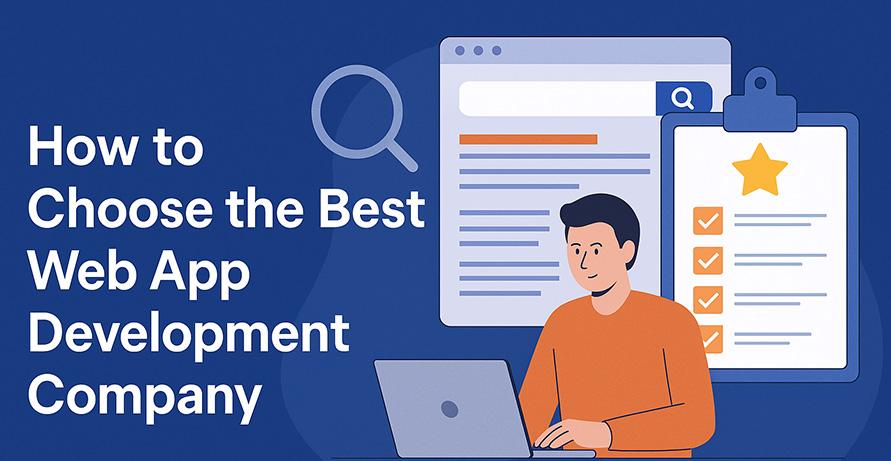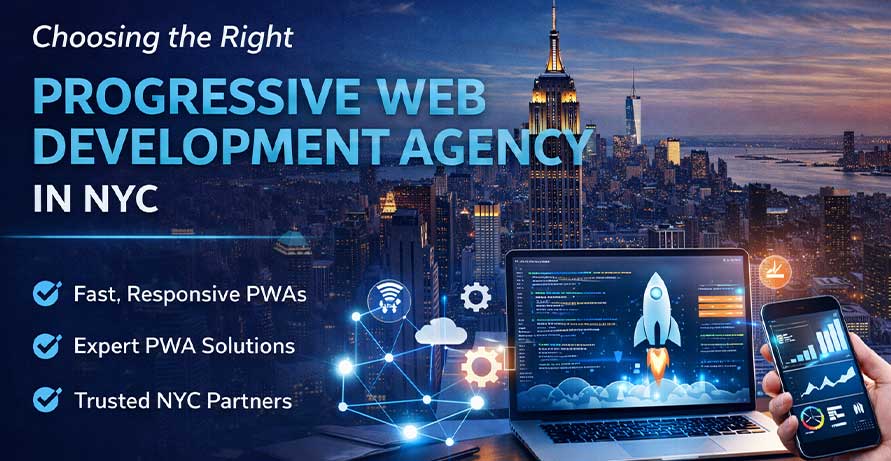How to Choose the Best Web App Development Company?

Choosing the right web app development company in 2025 is a critical business decision.
Modern web applications power:
- Customer portals
- SaaS platforms
- E-commerce systems
- Internal enterprise tools
- AI-driven dashboards
Technology is evolving fast. AI integration, cloud-native development, and stricter privacy regulations now shape every project.
Cost alone should never determine your choice. The right partner aligns technology with long-term business growth.
This guide explains how to evaluate a web application development company and avoid costly mistakes.
1️⃣ Align Business Goals Before Comparing Vendors
Before speaking to agencies, define your goals clearly.
Ask:
- Do you need faster time-to-market?
- Are you building a scalable SaaS platform?
- Do you require HIPAA or GDPR compliance?
- Is AI integration part of your roadmap?
Many digital projects fail because technical execution does not match business priorities.
Clear goals help you:
- Evaluate vendors objectively
- Avoid scope confusion
- Reduce rework
- Control budget
How Anchor Points Helps
Anchor Points starts every engagement with discovery workshops. We map business objectives to technical architecture before development begins.
2️⃣ Evaluate Technical Expertise and Modern Frameworks
A strong web app development company should demonstrate expertise in:
- JavaScript, TypeScript, Python
- React, Angular, Vue
- Laravel, Node.js, Django
- API-first architecture
- Microservices
- Cloud-native deployment
- DevSecOps practices
In 2025, enterprise web applications require:
- AI integration
- Real-time data processing
- Secure API connections
- Scalable infrastructure
Ask potential vendors:
- What frameworks do you specialize in?
- Do you build headless architectures?
- How do you handle cloud deployment?
- What is your security process?
Technical depth ensures your app performs reliably and scales smoothly.
How Anchor Points Helps
We specialize in:
- React and Next.js frontends
- Laravel and Node.js backends
- Secure API integrations
- Cloud-native and serverless deployments
Our architecture supports long-term scalability and performance.
3️⃣ Look for Industry Experience and Compliance Knowledge
Different industries require different expertise.
For example:
- Healthcare requires HIPAA compliance
- Finance requires PCI DSS standards
- Retail requires secure payment processing
- Education requires accessibility compliance
Industry knowledge reduces:
- Legal risk
- Rework
- Compliance penalties
- Delays
Choose a partner that understands your sector’s regulations and workflows.
How Anchor Points Helps
We build applications with built-in compliance frameworks, including:
- HIPAA
- GDPR
- CCPA
- ADA accessibility
Compliance is integrated from day one, not added later.
4️⃣ Assess Communication and Collaboration Style
Technical skill alone is not enough.
Successful projects depend on:
- Clear communication
- Agile development processes
- Transparent reporting
- Cultural alignment
Look for companies that offer:
- Sprint-based delivery
- Dedicated project managers
- Weekly progress updates
- Tools like Jira, Slack, or Teams
Poor communication often causes delays and budget overruns.
How Anchor Points Helps
We follow agile methodologies with:
- Two-week sprint cycles
- Real-time dashboards
- Dedicated client liaisons
- Clear milestone tracking
We operate as an extension of your internal team.
5️⃣ Evaluate Post-Launch Support and Scalability
Launching your app is only the beginning.
A reliable web app development company should provide:
- Ongoing maintenance
- Performance monitoring
- Security patching
- Feature enhancements
- Infrastructure scaling
Without proper support, applications may face:
- Downtime
- Security vulnerabilities
- Performance issues
- Integration failures
Ask about Service Level Agreements (SLAs) and support packages.
How Anchor Points Helps
We provide:
- 24/7 monitoring
- DevOps and cloud management
- Auto-scaling infrastructure
- Continuous optimization
Your platform stays secure and responsive as demand grows.
Red Flags to Avoid
Be cautious if a vendor:
- Focuses only on low pricing
- Lacks real case studies
- Cannot explain their architecture
- Avoids discussing security
- Offers no long-term support
- Uses outdated frameworks
Cheap development often leads to expensive fixes later.
Questions to Ask Before Hiring
Use this checklist:
- What industries do you specialize in?
- How do you ensure scalability?
- What is your security testing process?
- Do you provide long-term maintenance?
- Can you share enterprise case studies?
- How do you handle AI integration?
Clear answers show real expertise.
Final Takeaways
To choose the best web app development company in 2025:
- Define business goals first
- Verify technical expertise
- Check compliance experience
- Prioritize communication and agility
- Ensure long-term scalability
A web app is not just software. It is a growth engine.
The right partner ensures your application is:
- Secure
- Scalable
- High-performing
- Compliant
- Future-ready
FAQs
Q1. How much does it cost to hire a web app development company?
Small projects may cost $20,000–$50,000. Enterprise applications often exceed $200,000 depending on complexity.
Q2. What should I prioritize when choosing a web app development company?
Technical expertise, industry experience, security standards, scalability, and long-term support.
Q3. How long does it take to build a web application?
Simple apps may take 3–4 months. Complex enterprise platforms can require 9–12 months.
Q4. Is AI integration important in 2025 web applications?
Yes. AI supports personalization, automation, analytics, and predictive insights.
Q5. Why choose Anchor Points for web app development?
Anchor Points delivers secure, scalable, AI-ready enterprise applications with long-term support and agile collaboration.








